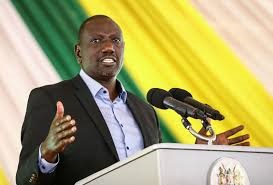
The Sunday Mail

Ranga Mataire
Group Political Editor
Kenyan President, William Ruto, who is scheduled to officially open the Zimbabwe International Trade Fair (ZITF) on Friday, is a vocal advocate of a borderless Africa that allows easy movement of goods and people.
Since assuming power two years ago, the Kenyan President has used several local and international platforms to enunciate his Pan-African vision of a borderless Africa.
During Africa’s struggle for independence, Pan-Africanism was a rallying call for Africans to take control of their political future. Today, Pan-Africanism is focused on the need for Africans to take control of their economies.
President Ruto pronounced his vision of a borderless Africa when he addressed delegates who attended the first Africa Climate Summit in Nairobi in September last year, where he said he was contemplating eliminating visas for travelers visiting Kenya, where humanity began.
“Kenya is home to all,” said President Ruto, referring to the discovery by scientists of the earliest remains of man on Earth in the East African nation. He told delegates that it was unfair to ask anybody coming home for a visa.
While the world welcomed President Ruto’s plans to scrap visas, it is on the African continent that his primary focus is fixated.
During a visit to Comoros in July last year, President Ruto reiterated his vision of a borderless Africa, saying it would enable the free movement of people and goods.
“We should eliminate borders and turn them into bridges to promote trade and investment on our continent.”
But how will the President’s Pan-African vision be implemented on a continent largely divided by colonial borders and variegated colonial languages?
Kenya has scrapped visas for visitors from South Africa and other countries to attract more investors and tourists, which will boost the country’s economy.
Nationals of East African Community states are already exempt from visas.
Other countries whose nationals do not need a visa to visit Kenya include Zambia, Zimbabwe, Malawi, Ghana, Singapore, Jamaica, and Cyprus.
President Ruto believes that the old political boundaries are old-fashioned, hamper development and only divides the continent.
He has taken every opportunity to urge African countries to eliminate barriers and integrate for economic prosperity.
He reiterated his message of a borderless Africa in May last year when he spoke during the launch of the IOM Report on the Status of Migration in East and the Horn of Africa at the Kenyatta International Convention in Nairobi.
Kenya is not the only country advocating for an open border policy.
Rwanda has also taken steps to bring the continent closer by allowing fellow Africans to enter the country visa-free. Both Kenya and Rwanda are following the lead of Benin, The Gambia and the Seychelles, which were the first countries to scrap visa requirements for intra-African travel.
Closer home, Zimbabwe and Botswana are moving ahead with plans to scrap passports. The two countries are fine-tuning the operational framework and modalities to allow people in the two countries to use identity documents.
This is in line with the broader vision of the African Union of an “integrated, politically united” Africa characterized by the free movement of people and trade.
President Ruto says it is people who move businesses; “When people cannot travel, business people cannot travel, entrepreneurs cannot travel, we all become net losers.”
But is a borderless Africa tenable? Africa is pushing for “One Africa” but can the continent clear the hurdles and truly unite?
It is a shame that non-African travellers have historically found it easier to travel within Africa than Africans themselves. Additionally, it is often cheaper to fly from Africa to Europe than within the African continent.
However, more African leaders are recognising the pressing need to create a borderless Africa, inspired by the ideals of the African Union (AU). They are aware that a borderless Africa would increase trade within itself and facilitate the free movement of people, promoting socio-economic and political development.
Yes, the pace is slow but there is no doubt that the issue of “One Africa” is reaching a crescendo never before imagined.
A commendable initiative is that of the African Passport and Free Movement of People under the AU’s Agenda 2063 which focuses on revising restrictive policies and legislation that hinder the interaction of African citizens across borders. It was a milestone for the continent to introduce an African passport in 2016, designed to enable holders to travel visa-free throughout the continent.
Initially, the passport was issued to diplomats and AU officials but plans are afoot to make it available to all African citizens once the legislations are in place. The COVID-19 pandemic derailed the rollout of the passport.
Once the concept of Pan-Africanism was associated mostly with liberation from colonialism. Today, the current generation of African leaders is pushing for Africa to realise full economic freedom by looing within itself. The benefits of Pan-Africanism are in the numbers.
The African Continental Free Trade (AfCFTA), launched in 2021, aims to unify over 1.2 billion Africans within a market. This union will create a market of an estimated US$3.4 trillion, making it the largest free trade area globally since the World Trade Organisation was established.
Intra-African trade currently accounts for only 15 percent of the continent’s total trade, compared to 58 percent in Asia and 67 percent in Europe. African countries are trading with economies of other continents more than they are with their own neighbours. This is what African leaders are working to fix.
In 2022, the AU launched AfCFTA Guided Trade Initiative permitting countries that have finalized legal agreements and submitted product offers to begin trading with each other.
Over 100 products have already been approved for trade, including sugar, ceramic tiles, processed meat products, batteries and dried fruits.
Kenya and Rwanda have so far sold domestic products like coffee and batteries to Ghana while South Africa has exported mining equipment, home appliances and refrigerators to neighbouring countries. The transactions are facilitated by documents certifying that the products are made from African-sourced materials, which qualifies them for reduced custom fees.
President Mnangagwa and President Ruto have a shared vision of “One Africa” with open borders. President Mnangagwa has consistently called on Africans to focus on mobilizing internal resources and promoting inclusive development that benefits all people and encourages cooperation among nations to ensure even development across the continent.
According to the 2023 Africa Visa Openness Index report, countries that open their borders enjoy numerous benefits in areas ranging from tourism and investment to overall GDP. It is time to walk that talk, and leaders such as President Ruto are showing the way.






